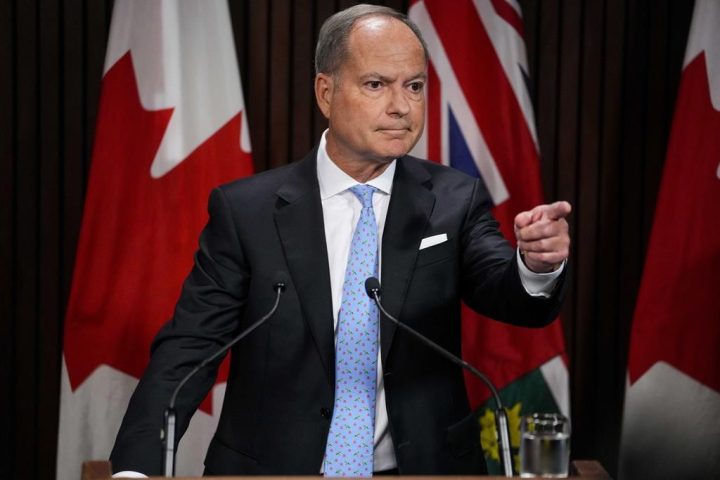Ontario is asking residents for their input on the upcoming budget, and questions in a public survey indicate major themes will be health-care staffing, transportation, jobs and the cost of living.

The provincial government plans to table its budget by March 31, and is now starting the process of public consultations, with a legislative committee travelling the province and an online survey that launched Wednesday.
The survey asks respondents what steps the government should take amid the current economic uncertainty, giving options such as infrastructure spending; tax incentives for small businesses; supporting families, workers and seniors through the increased cost of living; and eliminating the deficit.
In Ontario’s most recent fiscal update in November, the province projected a deficit of $12.9 billion in this fiscal year, followed by $8.1 billion the following year and a deficit of just $700 million in 2024-25.
Premier Doug Ford, speaking after an unrelated health-care announcement Wednesday, said he will “continue finding ways to put money back into people’s pockets,” citing previous steps to eliminate licence plate renewal fees and temporarily cutting the gas tax.
“We’ll continue making sure we have an economy that’s thriving and prospering,” Ford said.

Get breaking National news
“That’s the key area – if you have a strong economy, you’re creating great-paying jobs, companies and people, they pay up to the provincial coffers. That allows us to reinvest into the $150 billion of infrastructure.”
Finance Minister Peter Bethlenfalvy said in a statement that it is a critical time for the government to consider new ideas.
“Supporting people, workers and businesses in Ontario and setting up our economy to recover in the longer term will remain top priorities,” he wrote.

Bethlenfalvy also wrote that he is glad the budget consultations will have an in-person element this year. The legislative committee started hearings in Kenora, Ont., on Monday and is set to travel through eight other communities, before holding a final day of in-person presentations in Toronto on Feb. 14.
One survey question says Ontario is looking for ways to build a stronger health-care system and workforce, and asks for thoughts on priorities, including building hospitals, hiring more staff, better home care supports and upgrading long-term care beds.
The survey also indicates that transportation will continue to be a priority of Ford’s government, with a question asking what is most important, between areas such as “highways that cut down on commute time,” improving congestion in urban areas and cycling infrastructure.
As well, one question says the government is working to address labour shortages, and asks what areas should be prioritized, including employer incentives, apprenticeship and skills training, improving child-care access and supporting skilled newcomers.
- Ford government’s Bill 124 backpay cost increases again, closing in on $7B
- Ontario city cracking down on ‘slum’ landlords who ‘ruin neighbourhoods’
- Ontario ends 2023-24 with nearly balanced budget, partly due to international tuition
- 1st-degree murder charges laid after 2 people shot dead at Keswick, Ont. park
On a question of how to keep costs down for people, the government wants to know if residents think the best way to do that is through increasing the affordability of essential goods, increasing options for rental and affordable housing, introducing or expanding tax credits, or keeping commuter costs down.
But the survey responses may not necessarily be taken into account.
Former Liberal cabinet minister John Milloy wrote in a recent column for iPolitics that the timing – these consultations go to mid-February with a budget expected in late March – leaves him skeptical that they will have much of an impact.
“Anyone who has spent any time in government understands that budgets are planned many months in advance,” he wrote in the column.
“Although there is occasionally some last-minute tinkering, most of the heavy lifting has often been done before the consultations even begin.”







Comments